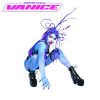The future as prophesied by works of science fiction has never felt more likely to transpire. In the past year alone, we’ve come closer to the sort of tech-dystopias as foretold by H.G Wells than ever before. There’s Zuckerburg’s unveiling of the Metaverse, a chilling new reality that once seemed like a distant possibility. The word ‘art’ may soon be replaced by three letters: N.F.T, and following 800 days of Zoom hosted social interaction, it’s easy to feel like our lived reality is actually The Matrix. Conversations around the future of humanism have never been more prescient. If reality itself changes, then naturally so must we. It seems inevitable that cyborgism should become the new body politic, our natural bodies augmented in order to survive in a world that is rapidly being converted to data. This idea has been a long recurring theme in pop music, with artists from Björk to Grimes exploring post-humanism aesthetically and thematically. But most of what’s been proposed has eliminated the human in post-human. In the case of Grimes, the future human is an indestructible android, powerful beyond natural means and seemingly devoid of such human frivolities like sentiment or pain. For Singaporean singer-songwriter Yeule however, it’s these very frivolities that are central to our increasing hybridisation with technology. For them, the post-human is capable of understanding emotion and desire beyond our natural means. Their cyborg is emotionally intuitive, enlightened beings programmed to process things beyond our comprehension rather than steely, soulless machines. Post-human is for Yeule the ultimate human, and on their sophomore record Glitch Princess, they assume the role of this sentient android on a record that looks to make sense of humanity’s impending evolution by embracing the synthesis.
Download and stream Glitch Princess here
It doesn’t seem quite right to refer to Yeule’s music as hyperpop, though the genre is probably the closest descriptor for us to access their sound . 2019’s Serotonin II used the sort of saturated and saccharine tonality typical of hyperpop, but then unlike the genre it was meditative instead of massive. Glitch Princess follows a similar course, but compared to Serotonin II is a markedly darker album which finds Yeule ruminating on existence and the dichotomy between life and death in the digital age. Yeule’s vocals remain feather light and syrupy, but there’s an inhuman strangeness that lurks beneath their robotised cradle songs. Even when exploring more straightforward pop territory, Glitch Princess is not quite right. Everything literally glitches with a sort of unnatural cadence. Tracks like Mandy are almost indistinguishable as anything human, or rather programmed in opposition to the human understanding of melody and structure. Opening with sci-fi computer beeps and an ominous droning synth chord, Mandy suddenly morphs into a mechanised beast of industrial noise and layers of electronic chaos. It’s unnerving and monstrous, devoid of a structure in a way that makes the experience of the track feel overwhelmingly alien. Fragments plays out like an extended interlude, with Yeule’s mechanised hydriad hums arriving after three minutes of what sounds like being pulled into the vacuum system of The Death Star. Yet Yeule manages to find moments that balance the uncanny with the serene. Glitch Princess often phases into lullaby-like harmony, Yeule’s computerised voice gently lulling you into a sort of dream state that plants their cyberpunk dystopia deep in your mind. Eyes is one such case, a sci-fi odyssey that floats its way from gentle piano keys to a whirring cosmos of industrial trip-hop. On Flowers are dead, a slow and deliberate glitch ballad that blooms and withers, Yeule’s voice is slowed and chopped into a jittery, unnatural drawl while somehow remaining strangely comforting.
Too Dead Inside and Bites On My Neck are the album’s most straightforward moments, along with the Y2K guitar pop of Don’t Be So Hard on Your Own Beauty. Too Dead Inside is Glitch Princess’s most familiar dance moment, but even then its choices are a bit odd. It’s as if Yeule programmed a bot to churn out a pop song after feeding it a diet of Sean Paul, Regina Spektor, and images of a Xenomorph. Then in perhaps the most audacious move ever made by any hyperpop affiliated act to date, Yeule closes Glitch Princess with a four hour and forty four minute ambient sound loop. It’s a move that blasts them from rising alt-pop star to full blown alt-pop auteur. Like a guided meditation, The Things They Did for Me Out of Love is a bold and beguiling piece of sound art that shifts between moments of droning spacey ambience and total silence. It is space given to process what has come before it, and allowing yourself to take the trip in its entirety is to confront the existential crisis of what awaits the future of our species. It’s a statement of intent that signals the arrival of Yeule as one of the most innovative and exciting pop acts in recent memory.
Watch the lyric video for Too Dead Inside from Glitch Princess below.
Follow Yeule
Instagram | Twitter | SoundCloud | Website



